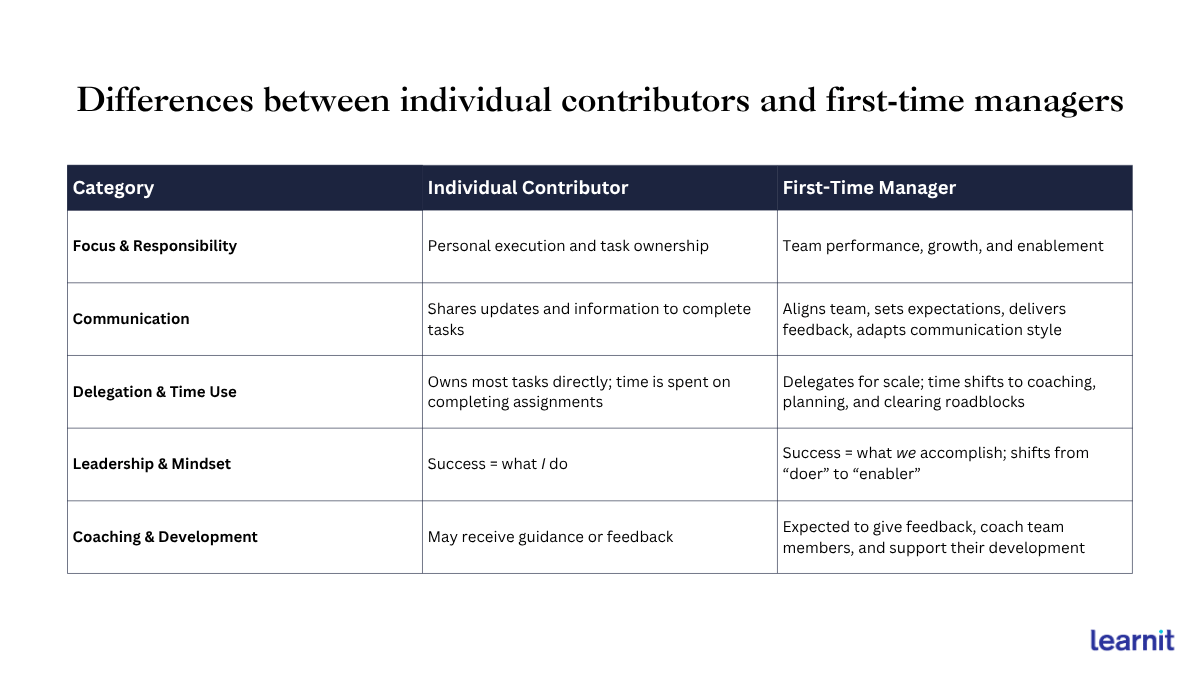BLOG
Becoming a first time manager? Discover 5 core skills every new leader needs to thrive. Practical, actionable tips to start managing successfully today.

A shocking fact: first-time managers receive poor ratings from 20% of their team members
The numbers paint a concerning picture. About 26% of new managers feel they weren't prepared to lead teams. Even more concerning, 60% stepped into their first leadership role without any training. These gaps in leadership development explain why half of all managers struggle to make an impact.
Your path to success as a new manager no longer depends on personal achievements but on your team's results. This transformation means that you need to learn new abilities like managing time, handling stress, building relationships, and delegating.
New managers need solid frameworks to run meetings, make decisions, optimize workflows, and review team performance. Your team wants regular input on their work because employees need feedback on a daily or weekly basis.
This article will give you the tools and strategies you need to become a successful manager and stand out from the statistics.
The leap from individual contributor to manager stands as one of the toughest career moves.
Research shows that all but one of these first-time leaders start their new role without any training. This leaves them unprepared for such a big change.

Management brings pressure from three sides at once. You set high bars for your performance.
Teams look to you as someone they can trust, someone who is professional yet approachable.
The executives want regular updates on projects and proof that you delegate effectively. This pressure hits hard early on.
Studies show that talking to their manager is the most stressful part of the day for nearly a third of employees.
Your viewpoint needs a radical alteration from "me" to "others.”
Natural management talent exists in only one in ten people, but others can develop these skills through deliberate changes in thinking. New managers often struggle because they lean too heavily on technical abilities that leadership roles require less of.
Your success now rides on how well your team performs rather than your performance.
New managers often burn out because they pile management duties on top of their old job.
Delegation creates growth opportunities - it's not about walking away from responsibility.
The math changes: Individual Contributor Value = Work Execution versus Manager Value = Work Execution + Capacity Building. So each task you hand off creates twice the value - the work gets done and team members grow.
Servant leadership turns traditional organizational behavior on its head.
You exist to support your team, not the other way around. This means helping them serve customers better and clearing roadblocks from their path. The service your staff provides to customers will never be better than the service you give to your staff.

A first-time manager's success depends on mastering specific core competencies. Let me get into the skills you need to develop.
Communication is the life-blood of successful management. This skill might be a manager's most critical competency.
New managers must adapt their approach to meet the needs of each team member. Clear communication helps everyone understand expectations and arrange teams to work together.
You should document important discussions in writing as a follow-up, especially when you have feedback or set expectations.
Many managers never receive formal training in delegation.
Real delegation gives both responsibility for outcomes and authority to achieve results. New managers often find delegation challenging, especially when you have been promoted for individual excellence.
Leadership isn't about personal achievements but helping your team excel. Delegation needs trust, and you must resist the urge to micromanage once tasks are assigned.
60% of new leaders say their transition stress ranks second only to divorce.
Studies show that all but one of these employees get promoted without adequate training.
Coaching bridges this gap. Successful coaching means listening to understand, asking powerful questions, balancing challenge with support, and setting clear next steps in conversations.
Employees respond better to feedback delivered constructively.
Good feedback targets specific actions rather than personality traits, suggests improvements, and keeps a respectful tone.
The SBI method—describing the Situation, specific Behavior observed, and the Effect it created—makes feedback clear and applicable.
Teams perform 20% better under managers who develop emotional intelligence. Emotional intelligence has four essential components:
Research shows 87% of employees believe empathetic leadership creates positive workplace change, and 85% say it boosts productivity.
HR departments bridge the skills gap for first-time managers. 83% of organizations know leader development matters, yet only 5% have rolled out development programs at all levels.
Effective HR teams develop well-structured frameworks that facilitate a smooth transition for new managers. These frameworks work best with four main phases:
A complete framework will give new managers better odds, since 40% currently fail within their first 18 months.
Each manager requires a customized training plan tailored to their specific skills. HR teams should build plans that cover:
The best training plans mix formal learning (20%), mentorship (30%), and hands-on experience (50%). This 70-20-10 model helps develop strong leaders.
Success in manager onboarding is evident in both numbers and feedback. The core performance indicators include:
Team performance changes under new leadership tell a clear story. Employee engagement scores reflect the effectiveness of managers in leading their teams. Staff retention rates are vital signs - 57% of employees have quit because of their managers.
New managers' time-to-productivity shows how well the onboarding works. Most companies want their new managers to hit full stride within 6-9 months.

Leadership development must continue beyond onboarding. Companies that make continuous learning a priority create 60% more engaged employees and achieve higher retention rates. Building an intentional culture of ongoing leadership growth should become a strategic priority.
Clear job descriptions with relevant competencies form the foundation of effective leadership development during recruitment.
HR teams should provide frameworks that help new managers integrate quickly during the onboarding process. Research shows employees are 69% more likely to stay three years with a company that offers great onboarding.
L&D teams must create advancement opportunities throughout a manager's tenure to retain talent. The opportunities should include participation in talent marketplaces, high-potential programs, and structured career paths.
HR can capture departing managers' knowledge through exit interviews and knowledge transfer sessions conducted during the offboarding process.
At Learnit, we’ve had the opportunity to upskill over 1.9 million people. Through our experience, we’ve helped many managers kick-start their leadership journey with these Learnit programs. Here’s what we recommend for first-time managers and aspiring leaders.
These training programs and workshops give first-time leaders a balanced toolkit of live instruction, practical templates, and ongoing support.

Here’s a round out your learning with a few trusted favorites:
Mixing these resources into your routine will keep new insights flowing and help you tackle manager life with confidence.
Leadership development must grow as organizations expand. McKinsey research shows that intentional investment in leadership development helps hypergrowth companies overcome limited management skill sets and inexperienced talent.
Organizations need to customize learning experiences to their priorities while giving learners choices that boost agency and participation. New skills become permanent through practice opportunities like simulations, role plays, and peer feedback.
The best approach combines synchronous learning for peer connections with asynchronous activities for individual pacing. Senior executives who share insights and lessons create powerful learning moments that promote a "one organization" mindset through a "leader-as-teacher" model.
Strong relationships with team members create the bedrock of good management. New managers who build meaningful connections turn abstract leadership concepts into everyday workplace reality.
One-on-one meetings give you and your team members a dedicated space for open dialogue. Team members who meet regularly with their manager are almost three times more likely to participate than those who don't. These meetings need to be:
Note that one-on-ones aren't just status updates. They help build trust, remove obstacles, collect feedback, and talk about growth.
Better team dynamics come from knowing your team's aspirations and abilities. Start with honest talks about their career goals, work style preferences, and their strengths. Then use some structured approaches:
Performance reviews show patterns that highlight strengths and areas for growth. Self-assessments help team members reflect on their work habits and how the organization can help them grow.
Tools like MBTI or StrengthsFinder can help line up roles with natural talents. The key is to listen carefully during these conversations—it builds rapport faster than any formal process.
Psychological safety means team members know they won't face punishment for speaking up. This guides state-of-the-art ideas and teamwork. Google's Project Aristotle research named it the number one predictor of team performance.
To encourage this environment:
Your team members should feel free to ask questions, share incomplete thoughts, and challenge current practices without fear of embarrassment or rejection.
Good communication forms the foundation of successful management. Your team's productivity and engagement levels depend on how well you master this skill as a new manager.
A framework for success starts with clear expectations. Your first week as manager should include documenting role responsibilities and performance standards. Nearly half of all U.S. employees report not knowing what's expected of them at work.
Team members need context about how their individual contributions link to the company's broader goals. This understanding helps them see their work and boosts engagement. You should be specific about deliverables, timelines, and quality standards to avoid confusion.
Professional development speeds up with regular feedback. Research shows that 80% of employees who receive meaningful feedback weekly say they participate fully. Feedback needs to:
Note that feedback is most effective when provided immediately after an action occurs. A two-way feedback channel should exist where your team feels at ease giving upward feedback.
New managers face their biggest problem in finding the right balance between openness and confidentiality. Trust grows with transparency, but you need good judgment about sharing information. Before sharing details, assess their sensitivity and what it all means. Ask yourself: "Does my team need this information to work well?" or "Could sharing this cause harm?".
Your discretion shows you can be trusted. Teams feel safe discussing challenges openly when managers keep appropriate confidentiality. It creates an environment where real communication thrives.

Delegation sets great leaders apart from those who struggle to manage effectively. During a coaching session, Tom, a new manager, laid out his three-page to-do list and felt swamped by his workload.
A task audit helps you decide what work you can hand over to others. Here's what to look for:
You can't delegate everything though. Tasks such as performance reviews and personnel matters should remain under your direct supervision.
Micromanagement destroys trust and makes everyone anxious. Your team works better when you focus on results instead of methods.
Let them know your goals and solve problems their way. Stephen Covey puts it well: "Here's what we're after. I want you to get the sale," rather than "Follow up on those leads".
The best delegation happens when team members truly own their work. Give them both tasks and the power to make decisions. Set up regular check-ins to guide them while letting them control the process.
Delegation strengthens your team rather than just passing off work. When you encourage accountability, your team grows and you can focus on what matters most.
Most employees face conflict at work, with studies showing 85% experiencing some form of disagreement. New managers should address these problems promptly before minor disagreements escalate into larger issues.
People often show subtle signs when conflicts start brewing. Team members might participate less in meetings, write shorter emails, or react defensively to feedback.
You might notice some employees becoming quiet or showing passive-aggressive behavior. Other warning signs include team members avoiding eye contact, staying unusually silent, or stepping back from group discussions.
Knowing how to understand other people's point of view helps resolve conflicts effectively. Pick a neutral location for mediation and let each person speak without interruption.
Talk about specific actions instead of personality traits - "The presentation got delayed because we saw things differently" works better than "You never take others' ideas seriously".
When you involve people with empathy, you can break down defensive barriers and change how conflicts play out.
Treat everyone equally to ensure fairness. Set clear behavior guidelines and apply them to everyone. Make sure to check in after solving the initial problem. This step shows that rebuilding trust takes time and commitment.
First-time managers must create an effective team environment to build lasting success. The team's culture directly affects performance and interactions among members.
Leaders who maintain an open-door policy show their accessibility and promote open communication flow.
Your team members will approach you faster with important situations when you stay approachable, which helps build closer working relationships.
A manager's behavior shapes 70% of workers' experience. Your presence and availability create an atmosphere where employees share ideas or concerns freely without fear of negative outcomes.
Strong interpersonal bonds develop beyond daily work through organized team-building exercises. New employees quickly merge into the team culture through these activities that showcase abilities beyond regular work skills.
Teams that participate in structured team-building consistently show higher performance levels with fewer conflicts. The most effective activities enhance specific skills like creativity, problem-solving, or communication.
Google's Project Aristotle research identified psychological safety as the top predictor of team performance. Team members believe that speaking up won't lead to punishment. First-time managers can promote this environment by:
Success in management transitions depends on setting strategic goals. New managers can increase their chances of success by setting clear objectives and monitoring progress.
Your first three months as a new manager need a well-laid-out 30-60-90 day plan. This framework helps break down complex responsibilities into manageable phases.
The first 30 days should focus on understanding the business, environment, and team dynamics.
Days 31-60 let you implement strategies that line up with company performance goals.
You can execute plans and review their effects against predefined metrics during days 61-90.
Research shows employees are 10.1 times more likely to feel motivated when they understand how their work supports company objectives.
The SMART framework (Specific, Measurable, Achievable, Relevant, Time-bound) helps create clear, applicable goals. Team meetings should include regular status updates to keep everyone informed about progress.
Employees become 6.7 times more motivated when their supervisors adjust goals based on current priorities.
Goal-setting becomes an active process through regular progress monitoring. Team members benefit from scheduled check-ins to discuss progress, address challenges, and celebrate wins.
These sessions provide opportunities to give feedback that connects individual efforts to broader objectives. This approach to continuous improvement encourages accountability and involvement. The data shows employees with goals are 3.6 times more likely to stay committed to their organization.
Small steps each day build credibility faster than grand gestures. You can acknowledge team contributions publicly, address concerns quickly, or simply be there when your team needs you. These consistent actions help establish your leadership presence.
Your management style should stay authentic yet adaptable. Good managers adjust their approach based on team members' needs without compromising their values. Experienced managers can provide explanations about handling complex situations that textbooks may not cover.
New managers need focused effort and constant growth in several areas to succeed. Many feel unprepared when they first step into leadership roles. Your success depends on how well you transition from being a team member to a leader.
This change brings its share of challenges. You need to adopt foundational leadership skills like communication, delegation, and emotional intelligence that are the foundations of good leadership.
Your team will work more effectively when you learn to give constructive feedback and create a safe environment.
Good relationships make successful management possible. You show dedication to your team's growth through regular one-on-one meetings, clear expectations, and a genuine interest in their goals. This investment leads to better involvement and increased efficiency.
Your ability to delegate tasks makes the difference between success and failure as a manager. Give team members the authority to manage their assignments and avoid micromanaging. This approach enables them to build their skills.
Companies should provide well-laid-out onboarding and ongoing development opportunities. Managers with proper training and support perform significantly better compared to those who must learn alone. Look for resources to learn and find mentors throughout your leadership experience.
With practice and training, you'll develop your style of leadership and avoid common mistakes that trip up new managers. Your dedication to improving today builds the base for your team's future success.
Your career takes a major turn when you move from being a team member to leading one for the first time. Your achievements now depend on how well your team performs, not just your work.
This change needs time and practice as you build your leadership skills. A clear set of goals at the start will help you succeed in your new role. New managers typically need three to nine months to hit key targets—sometimes even a full year.
Leadership success comes when you change your focus from yourself to your team. This change takes time, but by month three, you'll start feeling more at ease as a leader.
New managers don't need to know everything right away. Your role gives you a chance to learn and grow while directing your team toward company goals. What counts is owning up to mistakes and earning respect through your actions.
Keep looking for ways to boost your leadership skills. This will help you succeed as a manager and advance in your career. With good preparation and commitment to growth, you'll direct this exciting but sometimes challenging experience with growing confidence.
The main job of a first-time manager is to help the team do its best work. You set clear goals, give support, and make sure everyone has what they need to succeed. Think of yourself as the coach who guides the players, removes roadblocks, and keeps everyone working together.
Start by listening and learning. Meet with each team member, ask questions about their work, and find out what challenges they face. Share your expectations, explain how you like to communicate, and show that you’re there to help. Work on small wins. For example, fix a process, solve a nagging problem, or celebrate a quick success to build trust.
Week 1: Meet everyone, learn the team’s goals, and review current projects.
Week 2: Spot quick improvements—maybe a clearer checklist or a faster way to share updates.
Week 3: Set or confirm team goals and agree on how to measure progress.
Week 4: Hold your first team meeting, celebrate early wins, and outline next steps to maintain momentum.
Show up prepared, speak with confidence, and follow through on promises. Treat everyone fairly, keep private matters private, and admit mistakes instead of hiding them. When your team sees you’re honest, consistent, and reliable, they’ll respect your role and trust your leadership.

Want our articles in your inbox? Sign up for our blog newsletter to never miss out!